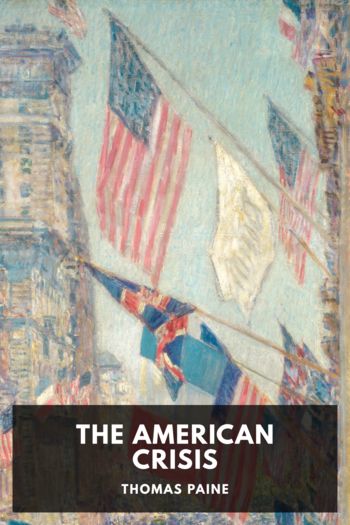Fateful Lightning: A New History of the Civil War & Reconstruction, Allen Guelzo [best thriller novels of all time txt] 📗

- Author: Allen Guelzo
Book online «Fateful Lightning: A New History of the Civil War & Reconstruction, Allen Guelzo [best thriller novels of all time txt] 📗». Author Allen Guelzo
Grant did not sit still for long in Tennessee, any more than he had in Mississippi the year before. In December 1863, Congress proposed to reward Grant for the Chattanooga victory by reviving the rank of lieutenant general, a grade filled only once before in the history of the United States Army, by George Washington. The bill passed the Senate on February 24, 1864, and Halleck then wired Grant to come to Washington to receive the commission. 9
The promotion to lieutenant general did two things for Grant. First, it immediately made him senior in rank to Halleck, who remained only a major general, and effectively booted Grant up to general in chief of the Federal armies. Halleck, with uncommon graciousness, stepped aside as general in chief to make way for Grant and assumed the new post of chief of staff to Secretary of War Stanton (a function he had actually been exercising since July 1862). Second, the promotion brought Grant east to meet with Lincoln and Stanton on March 8, and two days later the new lieutenant general rode out to the headquarters of the Army of the Potomac to meet George Gordon Meade and take the measure of the eastern army.10
Grant had heard rumors ever since the preceding summer that Lincoln wanted to drop Meade from command of the Army of the Potomac, chiefly because of Meade’s failure to follow and destroy Lee after Gettysburg, and the corollary of these rumors was that Lincoln meant to bring Grant east as Meade’s replacement. Knowing what a political cockpit the Army of the Potomac was, Grant had no desire whatever to offer himself as the next target for East Coast military intrigue. In the same letter in August 1863 in which he had broached the Mobile plan to Charles Dana, Grant laboriously thanked Dana “for your timely intercession in saving me from going to the Army of the Potomac. Whilst I would disobey no order I should beg very hard to be excused before accepting that command.” Even after his appointment as general in chief, Grant seems to have been determined to keep his headquarters in the west, and proceed with his plans to give the Army of the Potomac the shorter end of the strategic stick.11
In spite of himself, Grant was impressed with Meade and the army, and the War Department and various Republican congressional nabobs pressed on Grant the fact that Congress had bestowed the grade of lieutenant general on Grant principally in the hopes that he would lead the Army of the Potomac into battle against Lee in a showdown of tactical wits. “Unless this army of foes is defeated and broken, and our Capitol relieved of its fierce frowns,” argued Grant’s own chief of staff, John A. Rawlins, “we cannot hope that the recognition of the rebel government will be much longer postponed by European governments.” 12 By the time Grant returned to Nashville, he had decided to move his headquarters east and take up general tactical command of the eastern theater. He also revised his plans for operations in Virginia to include yet another overland campaign across the Rappahannock for the Army of the Potomac in order to confront Lee and bring the Army of Northern Virginia to battle.
Grant knew that he was taking considerable risks in coming east. For one thing, he was a westerner and a stranger with surprisingly little personal grandeur or charisma about him. “Grant is a man of a good deal of rough dignity; rather taciturn; quick and decided in speech,” observed Theodore Lyman as he studied the new commander. “He habitually wears an expression as if he had determined to drive his head through a brick wall, and was about to do it.” It took easterners such as Lyman some time to get used to a general who had no interest in fine reviews and hip-hiphoorah. “Grant… paid us a visit yesterday,” George Washington Whitman wrote to his mother on April 14, 1864. “There was no grand Review as is generally the case, but the Regiments just fell in line and Grant rode along and looked at them and then went on about his business.” A civilian friend of one of Grant’s staff officers was amazed that “there is no glitter or parade about him. To me he seems but an earnest business man.”13
Grant was also aware that, as a westerner, he was likely to be resented as an interloper by the Army of the Potomac. “The enlisted men thoroughly discussed Grant’s military capacity,” Frank Wilkeson remembered. “Magazines, illustrated papers, and newspapers, which contained accounts of his military achievements, were sent for, and eagerly and attentively read.” Most of the veterans were skeptical. “Old soldiers, who had seen many military reputations—reputations which had been made in subordinate commands or in distant regions occupied by inferior Confederate troops—melt before the battle-fire of the Army of Northern Virginia, and expose the incapacity of our generals, shrugged their shoulders carelessly. …” Wilkeson, who would be going into his first campaign under Grant, discovered that “Grant’s name aroused no enthusiasm. The Army of the Potomac had passed the enthusiastic stage. …”14
Grant anticipated that skepticism, and he even toyed with the idea of bringing McClellan back into the Army of the Potomac at some level to rally the jaded army. He also wisely retained Meade as titular commander of the Army of the Potomac (even though Grant himself would travel with





Comments (0)